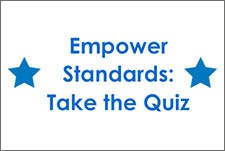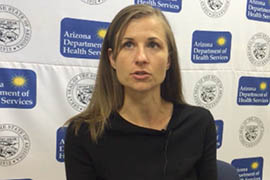Cronkite News has moved to a new home at cronkitenews.azpbs.org. Use this site to search archives from 2011 to May 2015. You can search the new site for current stories.
Preschools get licensing break for joining state nutrition-exercise program
At the Bright Horizons Family Center in Tempe, children eat more fruits, vegetables and whole-grain foods at snack time and participate in at least 60 minutes of teacher-led physical activity every day.
It’s part of a state program designed to help kids develop healthier habits and to reduce childhood obesity in Arizona.
In return for adopting the Empower Pack’s 10 standards for nutrition, physical activity and overall health, preschools and child care centers get a 50 percent break on licensing fees from the Arizona Department of Health Services.
Sherreis Moreland, director at Bright Horizons Family Center, said that the Empower standards are similar to things her facility was already doing.
“It helps children to be educated on healthy nutritional choices. What we serve during family-style meals helps them learn portion control, and it helps them learn what are healthy foods and what aren’t healthy foods,” she said. “The physical activity makes sure that kids are having plenty of exercise, but it’s also fun.”
The Empower program began in 2010, when licensing fees for child care centers and preschools increased, said Cynthia Melde, nutrition and physical activity program manager for the Arizona Department of Health Services.
“We had an opportunity from a prevention standpoint to look at the child care environment and see an opportunity to help reduce the burden of obesity amongst that childhood population,” she said.
At present, licensing fees, which are based on the number of children, range from about $1,000 to $7,800 before the Empower Pack discount.
Empower Pack provides materials, training and guidelines on healthy habits for children.
Trisha Lucas, education director for Desert Sun Child Development Center, said that the program’s materials expanded on what her center was already trying to provide for children.
“Empower helped to reemphasize what we were doing in our center in providing healthy snack choices and promoting physical activity, as well as teaching them how to be independent and serve themselves,” she said.
Empower standards require family-style meals, where children and staff eat together and serve themselves, and at least 60 minutes of physical activity a day.
“It allows us to help increase learning here by understanding that there’s a relationship between physical activity and cognitive development,” Moreland said.
Melde said it’s the teacher-led aspect of the program’s physical activity requirement that helps build more than just fitness.
“We’re also helping build their mind-body connection and giving their brain some development opportunities as well,” she said.
Empower standards also require staff to take part in three hours of training a year on Empower topics such as physical activity, nutrition, oral health and tobacco education.
Cassie Welch, assistant director at Tempe Christian Preschool, said that the resources and training have expanded the curriculum there.
“Empower has allowed me to train my staff on various aspects of the program, such as snacktime conversations and encouraging physical activity,” she said.
One of the goals of Empower is getting providers to work with families and parents to continue the healthy habits at home, Melde said.
“There’s a lot more engagement from the child care providers to the families under the Empower program,” she said.
Some of the standards focus on topics other than nutrition and physical activity, including oral health education and tobacco education.
“It’s beyond obesity prevention, it’s really a holistic look at health as well,” Melde said.









